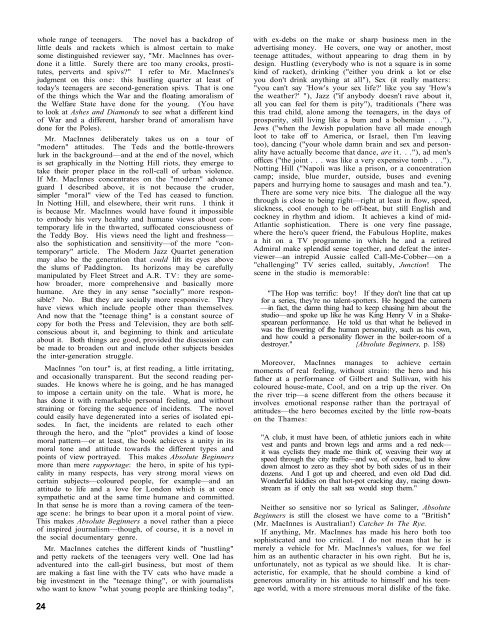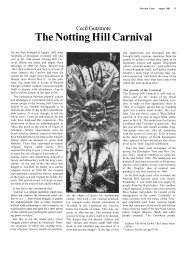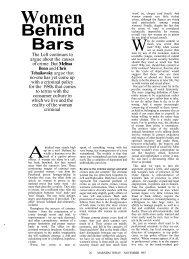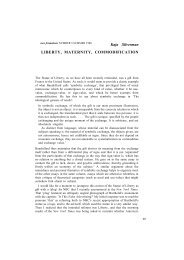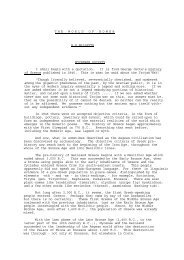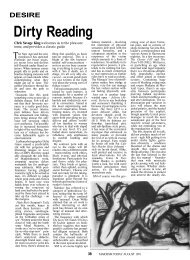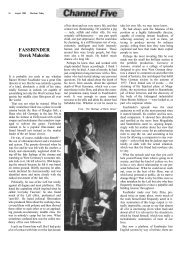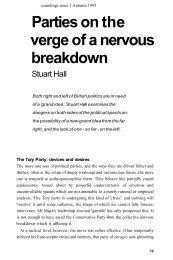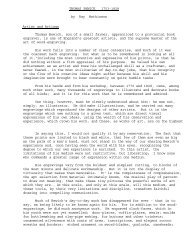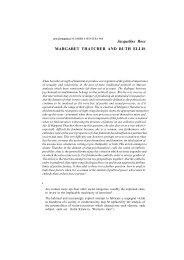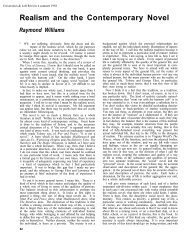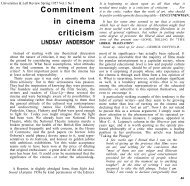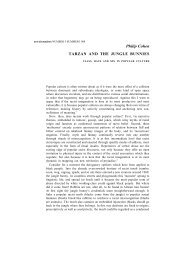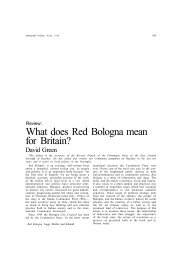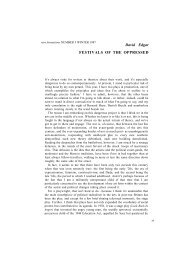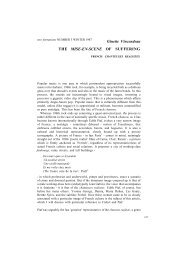Absolute Beginnings Stuart Hall
Absolute Beginnings Stuart Hall
Absolute Beginnings Stuart Hall
You also want an ePaper? Increase the reach of your titles
YUMPU automatically turns print PDFs into web optimized ePapers that Google loves.
whole range of teenagers. The novel has a backdrop of<br />
little deals and rackets which is almost certain to make<br />
some distinguished reviewer say, "Mr. Maclnnes has overdone<br />
it a little. Surely there are too many crooks, prostitutes,<br />
perverts and spivs?" I refer to Mr. MacInnes's<br />
judgment on this one: this hustling quarter at least of<br />
today's teenagers are second-generation spivs. That is one<br />
of the things which the War and the floating amoralism of<br />
the Welfare State have done for the young. (You have<br />
to look at Ashes and Diamonds to see what a different kind<br />
of War and a different, harsher brand of amoralism have<br />
done for the Poles).<br />
Mr. MacInnes deliberately takes us on a tour of<br />
"modern" attitudes. The Teds and the bottle-throwers<br />
lurk in the background—and at the end of the novel, which<br />
is set graphically in the Notting Hill riots, they emerge to<br />
take their proper place in the roll-call of urban violence.<br />
If Mr. MacInnes concentrates on the "modern" advance<br />
guard I described above, it is not because the cruder,<br />
simpler "moral" view of the Ted has ceased to function.<br />
In Notting Hill, and elsewhere, their writ runs. I think it<br />
is because Mr. MacInnes would have found it impossible<br />
to embody his very healthy and humane views about contemporary<br />
life in the thwarted, suffocated consciousness of<br />
the Teddy Boy. His views need the light and freshness—<br />
also the sophistication and sensitivity—of the more "contemporary"<br />
article. The Modern Jazz Quartet generation<br />
may also be the generation that could lift its eyes above<br />
the slums of Paddington. Its horizons may be carefully<br />
manipulated by Fleet Street and A.R. TV: they are somehow<br />
broader, more comprehensive and basically more<br />
humane. Are they in any sense "socially" more responsible?<br />
No. But they are socially more responsive. They<br />
have views which include people other than themselves.<br />
And now that the "teenage thing" is a constant source of<br />
copy for both the Press and Television, they are both selfconscious<br />
about it, and beginning to think and articulate<br />
about it. Both things are good, provided the discussion can<br />
be made to broaden out and include other subjects besides<br />
the inter-generation struggle.<br />
MacInnes "on tour" is, at first reading, a little irritating,<br />
and occasionally transparent. But the second reading persuades.<br />
He knows where he is going, and he has managed<br />
to impose a certain unity on the tale. What is more, he<br />
has done it with remarkable personal feeling, and without<br />
straining or forcing the sequence of incidents. The novel<br />
could easily have degenerated into a series of isolated episodes.<br />
In fact, the incidents are related to each other<br />
through the hero, and the "plot" provides a kind of loose<br />
moral pattern—or at least, the book achieves a unity in its<br />
moral tone and attitude towards the different types and<br />
points of view portrayed. This makes <strong>Absolute</strong> Beginners<br />
more than mere rapportage: the hero, in spite of his typicality<br />
in many respects, has very strong moral views on<br />
certain subjects—coloured people, for example—and an<br />
attitude to life and a love for London which is at once<br />
sympathetic and at the same time humane and committed.<br />
In that sense he is more than a roving camera of the teenage<br />
scene: he brings to bear upon it a moral point of view.<br />
This makes <strong>Absolute</strong> Beginners a novel rather than a piece<br />
of inspired journalism—though, of course, it is a novel in<br />
the social documentary genre.<br />
Mr. MacInnes catches the different kinds of "hustling"<br />
and petty rackets of the teenagers very well. One lad has<br />
adventured into the call-girl business, but most of them<br />
are making a fast line with the TV cats who have made a<br />
big investment in the "teenage thing", or with journalists<br />
who want to know "what young people are thinking today",<br />
24<br />
with ex-debs on the make or sharp business men in the<br />
advertising money. He covers, one way or another, most<br />
teenage attitudes, without appearing to drag them in by<br />
design. Hustling (everybody who is not a square is in some<br />
kind of racket), drinking ("either you drink a lot or else<br />
you don't drink anything at all"), Sex (it really matters:<br />
"you can't say 'How's your sex life?' like you say 'How's<br />
the weather?' "), Jazz ("if anybody doesn't rave about it,<br />
all you can feel for them is pity"), traditionals ("here was<br />
this trad child, alone among the teenagers, in the days of<br />
prosperity, still living like a bum and a bohemian . . ."),<br />
Jews ("when the Jewish population have all made enough<br />
loot to take off to America, or Israel, then I'm leaving<br />
too), dancing ("your whole damn brain and sex and personality<br />
have actually become that dance, are it. . ."), ad men's<br />
offices ("the joint . . . was like a very expensive tomb . . ."),<br />
Notting Hill ("Napoli was like a prison, or a concentration<br />
camp; inside, blue murder, outside, buses and evening<br />
papers and hurrying home to sausages and mash and tea.").<br />
There are some very nice bits. The dialogue all the way<br />
through is close to being right—right at least in flow, speed,<br />
slickness, cool enough to be off-beat, but still English and<br />
cockney in rhythm and idiom. It achieves a kind of mid-<br />
Atlantic sophistication. There is one very fine passage,<br />
where the hero's queer friend, the Fabulous Hoplite, makes<br />
a hit on a TV programme in which he and a retired<br />
Admiral make splendid sense together, and defeat the interviewer—an<br />
intrepid Aussie called Call-Me-Cobber—on a<br />
"challenging" TV series called, suitably, Junction! The<br />
scene in the studio is memorable:<br />
"The Hop was terrific: boy! If they don't line that cat up<br />
for a series, they're no talent-spotters. He hogged the camera<br />
—in fact, the damn thing had to keep chasing him about the<br />
studio—and spoke up like he was King Henry V in a Shakespearean<br />
performance. He told us that what he believed in<br />
was the flowering of fhe human personality, such as his own,<br />
and how could a personality flower in the boiler-room of a<br />
destroyer." {<strong>Absolute</strong> Beginners, p. 158)<br />
Moreover, MacInnes manages to achieve certain<br />
moments of real feeling, without strain: the hero and his<br />
father at a performance of Gilbert and Sullivan, with his<br />
coloured house-mate, Cool, and on a trip up the river. On<br />
the river trip—a scene different from the others because it<br />
involves emotional response rather than the portrayal of<br />
attitudes—the hero becomes excited by the little row-boats<br />
on the Thames:<br />
"A club, it must have been, of athletic juniors each in white<br />
vest and pants and brown legs and arms and a red neck—<br />
it was cyclists they made me think of, weaving their way at<br />
speed through the city traffic—and we, of course, had to slow<br />
down almost to zero as they shot by both sides of us in their<br />
dozens. And I got up and cheered, and even old Dad did.<br />
Wonderful kiddies on that hot-pot cracking day, racing downstream<br />
as if only the salt sea would stop them."<br />
Neither so sensitive nor so lyrical as Salinger, <strong>Absolute</strong><br />
Beginners is still the closest we have come to a "British"<br />
(Mr. MacInnes is Australian!) Catcher In The Rye.<br />
If anything, Mr. MacInnes has made his hero both too<br />
sophisticated and too critical. I do not mean that he is<br />
merely a vehicle for Mr. MacInnes's values, for we feel<br />
him as an authentic character in his own right. But he is,<br />
unfortunately, not as typical as we should like. It is characteristic,<br />
for example, that he should combine a kind of<br />
generous amorality in his attitude to himself and his teenage<br />
world, with a more strenuous moral dislike of the fake.


